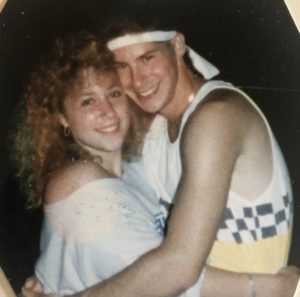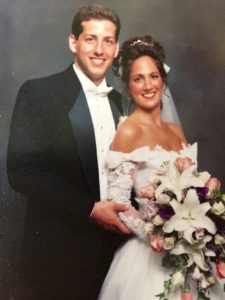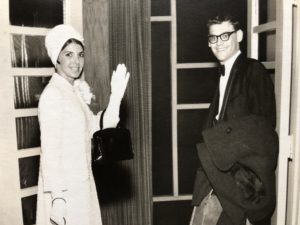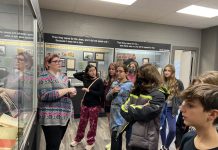
The song of the summer in 1988 was Richard Marx’s “Hold Onto the Night,” though Guns N’ Roses’ “Sweet Child O’ Mine” was also an earworm, at least for Randi and Kenny Leese.
It was a memorable summer, the year the two of them met at Golden Slipper Camp in the Poconos. Now looking back at their summer camp memories after 27 years of marriage, the significance of the experience is clear: “I wasn’t looking for a wife,” Kenny Leese said. “I was looking for fun, which turned into a girlfriend, fiance, then marriage. But it’s really those connections. It’s really just sitting there, bonding, every day.”
The Leeses aren’t the only couple who met at Jewish summer camp. The sleepaway camp experience is a cultural touchstone for so many Jews, and the genesis of quite a few relationships. With another year of camp on the horizon, couples reminisce about the good ol’ days.
Golden Slipper Camp
When Kenny Leese said he wasn’t looking for a wife during his 1988 summer as a Golden Slipper camp counselor, he meant it.
He took interest in another girl at Golden Slipper, even after meeting young counselor Randi Leese briefly on move-in day.
“You hook up with people,” Kenny Leese said. “It’s what you do.”
Randi Leese didn’t take this personally; she also was interested in someone else. But when the two talked again at a basketball game he was reffing, their friendly relationship started to change.
“I remember every morning the whole camp would gather around the flagpole first and do roll calls before we would go into the dining hall,” Randi Leese said. “And he would give me lollipops, Tootsie Roll pops. And I thought, ‘Oh, that was very nice.’”
One night, when Kenny Leese planned on meeting up with another girl and Randi Leese planned to go home on an overnighter, the two ended up talking.
“I never went off with the other girl,” Kenny Leese said. “Thirty-four years later, here we are.”
“Two kids and a dog later,” Randi Leese added.
The couple was engaged in 1993 and married two years later.
Likewise, Bonnie Chalfin wasn’t expecting to meet her now-husband Rob Chalfin at Golden Slipper in 1989. He was dating another girl at the time and was hard to get to know.
The then-friends kept in touch over the summer, and Bonnie Chalfin found out about his break-up. Their relationship developed “organically,” and the two later married.
Rob Chalfin wasn’t the only one with whom Bonnie Chalfin stayed in contact. The couple made friends with several other couples, who still keep in touch. Their kids are now becoming good friends.
“It’s like a family bond,” Bonnie Chalfin said.

Camps Arthur and Reeta
Decades before the Leeses and Chalfins met, Elliot Rosen worked as a counselor at the Zieglersville-based Camp Arthur, the sibling camp to Camp Reeta, which were part of the Young Men’s-Young Women’s Hebrew Association, the precursors to the JCCs of today.
Rosen was a camp veteran, attending the camp as a camper at age 11 in 1952, and graduating to counselor in 1957 at 17. In 1958, camp newbie Maxine Rosen, hailing from Salisbury, Maryland, came to Camp Reeta as a counselor-in-training.
Unlike the Golden Slipper couples, Elliot Rosen’s intentions were clear when he first met his to-be wife. He was a skinny kid at the time, and a friend of his interrupted a basketball game to introduce him to her friend.
“We stopped the basketball game, underneath the basket, so she could introduce me to her friend, Maxine Dattelbaum,” Elliot Rosen said. “And I looked at Maxine, and I knew I was going to marry her.”
It was, of course, not that simple. Maxine Rosen was less impressed than Elliot Rosen was with their respective appearances, but their overlapping schedules meant the two remained friendly over their seven or eight interactions that summer, despite living on opposite sides of the ground’s lake.
Maxine Rosen didn’t return to camp the next year, but did the year after. The couple’s relationship bloomed but then faltered due to distance, college and jobs.
In 1962, Elliot Rosen’s last year of summer camp, he received a “Dear John” letter from Maxine Rosen, saying she was seeing other people in college.
“I was very melancholy at the end of summer of ‘62, knowing that, I guess, my youth was ending,” Elliot Rosen said.
His fortune took a turn the next year, when he learned of Maxine Rosen’s breakup when he was on a nine-week trip across Europe. He sent her a post card but didn’t hear back.

By 1965, the two at last reunited in Washington, DC, just for the afternoon.
“I saw Elliot, and he was a completely transformed person,” Maxine Rosen said. “He had filled out; his teeth were kind of straighter; his face was fuller. He was very handsome.”
By July of that year, the couple planned to get engaged.
“Around three in the morning, I woke my mother up and told her that I asked Maxine if she would accept a ring from me,” Elliot Rosen said. “My mother told me, until her dying day, from that minute on, she never came down from the ceiling, that she was in the clouds.”
Why Summer Camp?
Though every couple’s story is different, the summer camp setting as a hotbed for meet-cutes begs the question: Why do so many young couples meet at summer camp?
No one really thinks it’s a coincidence, but for Bonnie Chalfin, it’s difficult to put into words.
“It’s just a different kind of connection than, even a day camp or sports team or neighborhood friend group,” she said. “It’s all those similar stories, all the songs and the teams … It’s just an intangible thing.”
After 56 years of marriage, Elliot and Maxine Rosen have seemed to figure out what brought them together in an unlikely way.
“You see people for who they are. If they’re gonna cheat, it’s something you would see; if they’re not nice to somebody, you would see it; if they’re genuine, you see it,” Maxine Rosen said. “You just see qualities. You’re not hiding behind anything.”






